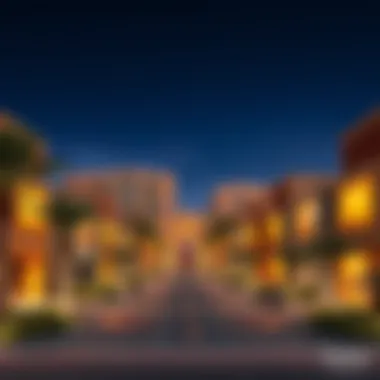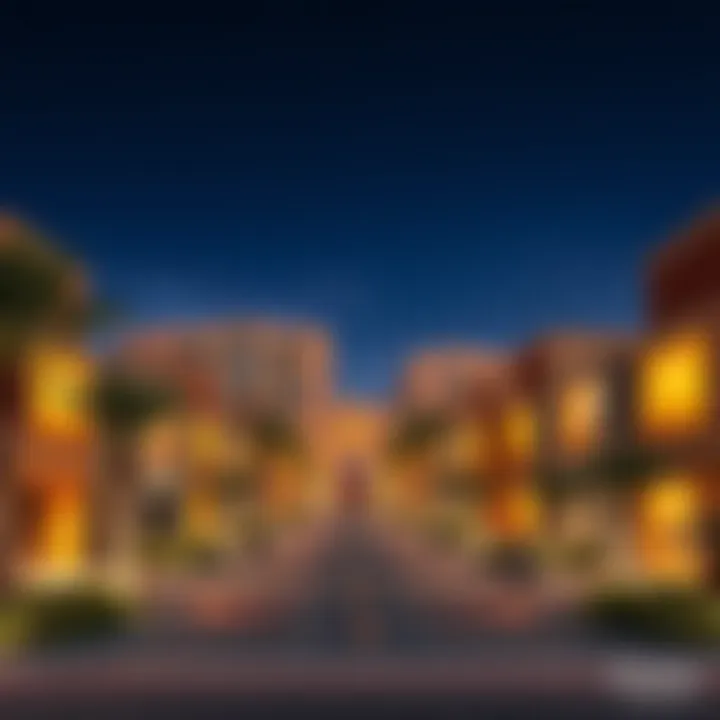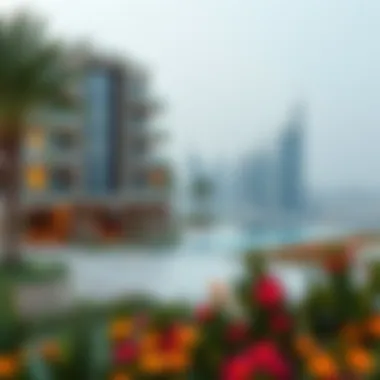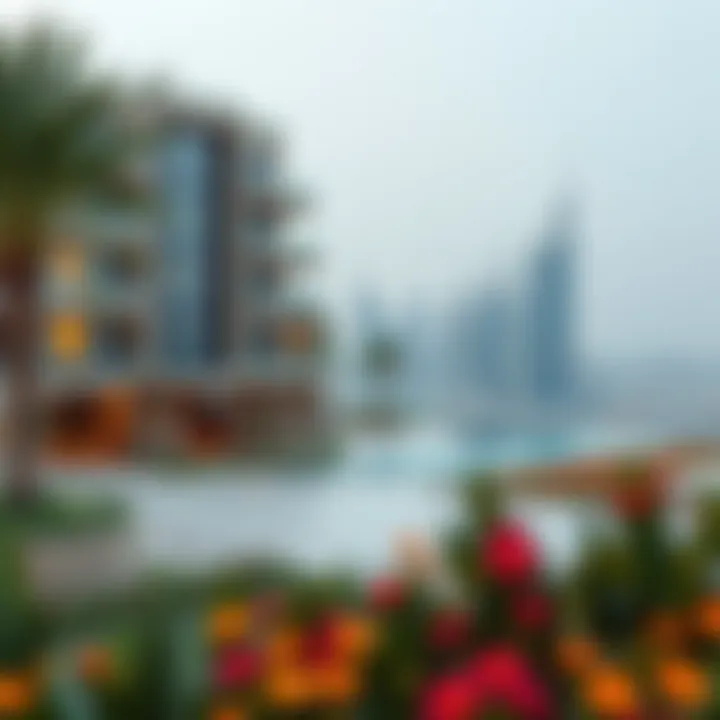Discover New Opportunities in Dubai's Real Estate


Intro
Dubai's real estate market has always been a cauldron of dynamism and innovation. As we forge ahead into a new era, this market is not just keeping up with trends; it is, instead, setting them. With a flurry of new developments and burgeoning neighborhoods cropping up across the city, the opportunities for investment are not just plentiful but ripe for the picking.
For prospective buyers, investors, real estate agents, and developers, understanding the intricate dance of market trends and the nuances of local legislation is paramount. The landscape is shifting quickly, and keeping one’s finger on the pulse is essential. Within this article, we will peel back the layers of Dubai's evolving real estate tapestry, uncovering insights that even seasoned investors might overlook.
Market Insights
Current Market Trends
The real estate scene in Dubai is experiencing a notable renaissance. Post-pandemic recovery has fueled a surge in demand, with both expatriates and locals re-evaluating their living situations. One clear trend is the soaring interest in luxury properties and community-focused developments. There is an observable uptick in the demand for townhouses and villas in up-and-coming areas, augmenting the need for more holistic living experiences.
This movement towards self-sustaining communities has seen neighborhoods like Dubai Hills Estate and Mohammed Bin Rashid City emerge as frontrunners. The appeal of walking paths, parks, and recreational facilities not only highlights a shift in buyer preferences but also indicates a broader trend toward integrating lifestyle with living space.
Economic Factors Influencing Prices
Several economic factors contribute to the flux in property prices. Global inflation rates, fluctuating oil prices, and geopolitical developments play their roles. For example, as oil prices rebound, there is an increased flow of capital into Dubai, benefiting the real estate market. Moreover, the eased visa restrictions targeting skilled workers and entrepreneurs have attracted a wave of new buyers looking to invest.
Understanding market cycles is crucial in these times. While growth is currently robust, there are signs that may indicate a cooling period ahead. Investors are advised to remain vigilant, ensuring they make informed decisions based on comprehensive market data and trends.
Investment Opportunities
High-Yield Neighborhoods
As the market evolves, some neighborhoods stand out for their high return on investments. Areas like Dubai Marina, known for its vibrant nightlife and picturesque waterfront views, continue to attract buyers.
In addition, consider the less saturated locales such as Jumeirah Village Circle and Arjan, where prices remain more reasonable, yet the potential for appreciation is significant. These neighborhoods are set to benefit from the ongoing infrastructure improvements, making them promising options for savvy investors looking to maximize their returns.
"Investing in areas with future development potential can lead to impressive gains. It’s like betting on the underdog just before they hit their prime."
Property Types for Investment
The property types available in Dubai also reflect the changing preferences of buyers. Investors might explore:
- Luxury apartments that cater to expatriates and affluent locals.
- Commercial spaces, particularly in areas where businesses are thriving.
- Short-term rental opportunities, which have gained momentum given the city’s tourism boom.
Investors must weigh each property type against their investment goals. A thorough understanding of the legal landscape, such as property ownership regulations, is essential to navigate this labyrinth effectively.
Prelims to Dubai's Evolving Real Estate Scene
The landscape of Dubai's real estate market is a thrilling odyssey that captivates both local and foreign interest. From tall towers piercing the sky to sprawling communities blending tradition with modernity, the continual evolution of this city makes it a playground for investors and homebuyers alike. Understanding this scene is crucial, as it isn't merely about properties; it's about grasping the broader economic forces and societal trends shaping this vibrant hub.
Significance of Real Estate in Dubai's Economy
Real estate holds a special place in Dubai's economy, acting as a linchpin for growth and development. It contributes significantly to the GDP and provides numerous jobs in various sectors. More than just buildings, it embodies the dreams and aspirations of individuals looking for both personal space and lucrative investments. Each new project is a testament to the city’s ambition, symbolizing progress and a diverse cultural identity.
For instance, according to a report from the Dubai Land Department, real estate transactions have displayed resilience and a steady upward trend, even amidst changing global economic conditions. Simply put, the real estate sector is a critical pillar that supports Dubai's overall economic structure.
Factors Driving New Developments
Several factors are fueling the surge in new developments within Dubai. The city's strategic location between East and West makes it a nexus for global trade and tourism, attracting investors eager to tap into this bustling market. High standards of living, governmental stability, and an investor-friendly regulatory framework contribute to the allure of Dubai as a prime real estate destination.
In essence, new developments stem from a mix of:
- Population Growth: With a melting pot of cultures, Dubai’s population continues to swell, driving demand for housing.
- Infrastructure Development: Major projects like the Expo 2020 have paved the way for new roads, public transport, and facilities, enhancing accessibility.
- Government Initiatives: Policies such as long-term visas for foreign residents and relaxed property ownership laws for expatriates bolster market confidence and draw in capital.
As these factors unfold, it becomes clear that the real estate scene in Dubai isn't just about buildings rising in the skyline; it's about a dynamic interplay of markets and social transformations that positions Dubai as a forward-thinking metropolis. This exploration of local trends serves as a foundation for understanding the multifaceted opportunities available in this ever-evolving landscape.
Recent Additions to Dubai's Landscape
Recent additions to Dubai's real estate landscape are significant because they illustrate not only the city’s drive for continual development but also its adaptability to changing market demands. Every project, from residential neighborhoods to commercial hubs, represents new opportunities for investors and potential homeowners alike. As such, understanding these new developments can guide informed decision-making in a marketplace that is constantly evolving. It's like catching the wave before it fully breaks; being aware of these changes ensures you’re not left in the dust.
Intro to New Neighborhoods
In Dubai, the rise of new neighborhoods is akin to branches sprouting from a thriving tree. Places like Dubai Creek Harbour and Dubai Hills Estate are not just additions; they are meticulously planned communities designed to meet the needs of diverse demographics. These neighborhoods are often surrounded by natural beauty, blending the urban experience with serene landscapes. Moreover, the mix of residential, commercial, and leisure spaces provides a holistic living experience, appealing to both families and young professionals.
Key Residential Developments


Luxury Housing Options
Luxury housing options in Dubai have taken on a new meaning. Today's affluent buyers are looking for more than just opulence; they want exclusivity and character. Developments like Palm Jumeirah’s latest villas exemplify this aspiration with their bespoke architectural styles and waterfront views. These homes often come with smart technology integration, ensuring that comfort and modernity coexist harmoniously. However, while the initial lure of such properties is undeniable, one must also consider the maintenance costs associated with luxury living, which can add up quickly.
Affordable Living Spaces
On the flip side, affordable living spaces are gaining traction within Dubai's real estate offers. Developments such as Dubai South focus on providing high-quality accommodations at competitive prices. The key characteristic of these living options is accessibility; they cater not only to young families looking for budget accommodations but also to expatriates searching for a foothold in the city. Unique features like community amenities—pools, gyms, and parks—increase their attractiveness. However, potential buyers should be aware that these developments can sometimes compromise on size or location, leading to a trade-off that needs careful consideration.
New Commercial Zones
New commercial zones are expanding rapidly alongside the residential boom. Areas such as the Dubai Design District are cultivating creative industries, positioning themselves as hotspots where startups and freelancers can flourish. These zones also contribute to an overall increase in employment opportunities, enhancing the attractiveness of surrounding residential projects. The adaptability of commercial spaces to various business needs showcases Dubai's commitment to remaining a global hub for trade and innovation.
Architectural Innovations and Design Trends
The architectural landscape of Dubai is a dynamic tapestry, woven together by a blend of forward-thinking designs and practical applications. The emphasis on architectural innovations within this article is pivotal because these elements aren't merely aesthetic; they resonate deeply with the aspirations of investors, homebuyers, and the wider community. With a city that constantly reinvents itself, staying abreast of architectural trends is not just a luxury, but a necessity.
Sustainable Building Practices
Sustainability has moved from being a buzzword to a fundamental practice in Dubai's real estate development. Developers are increasingly adopting eco-friendly materials and practices that minimize environmental impact and enhance energy efficiency.
For instance, many new buildings are equipped with solar panels that harness the sun’s power, a nod to Dubai's abundant sunshine. Green roofs and walls, which implement flora to insulate buildings, have also gained popularity. These sustainable practices not only reduce operational costs but also appeal to environmentally-conscious buyers, further driving demand. Such innovations ensure that developers stay ahead of the curve and attract investors who prioritize sustainability in their portfolios.
Integration of Technology in Real Estate
The pace of technological advancement is relentless and has seeped into the very DNA of Dubai's real estate market. Smart homes have transitioned from a gimmick to a key selling point, blending convenience, security, and efficiency.
Smart Home Features
Smart home technology facilitates control over various systems in the home — lighting, HVAC, security, and entertainment — through user-friendly interfaces. One key characteristic of smart home features is the ability to integrate with smartphones, allowing users to manage their home remotely. This tech trend appeals to a broad audience; many younger buyers appreciate the convenience, while families value the increased security and energy savings.
However, this technology doesn’t come without drawbacks. The initial costs associated with outfitting a home with smart devices can be considerable, potentially placing it out of reach for some buyers. Additionally, there’s an ongoing need for updates and maintenance to keep systems running smoothly.
Virtual Reality in Real Estate Tours
Virtual reality (VR) is rewriting the rules of property viewing. It provides prospective buyers with an immersive experience, allowing them to explore properties from anywhere in the world. One of the standout characteristics of virtual reality in real estate tours is its ability to create realistic renderings of properties still in development, offering a glance into the future.
This technology not only saves time but enhances accessibility for international investors who might not be able to visit Dubai in person. It enables them to visualize spaces and layouts, facilitating better decision-making. The downside, however, is that the experience may not fully replicate being on-site, potentially missing the nuances of a property's ambiance.
Investing in innovative architectural trends ensures that buyers are not just purchasing property but becoming part of a sustainable future.
Investment Opportunities in New Locations
Dubai's real estate market is a dynamic tapestry, ever-changing and rich with promise for investors. The shift toward new investment opportunities in lesser-known neighborhoods is capturing the attention of savvy investors looking for a slice of Dubai's vibrant growth. There’s a palpable buzz in the air for emerging areas, which offer potential not just for financial gain, but strategic positioning in an evolving city. As the old saying goes, "strike while the iron is hot," and now might be the ideal time to dive into these burgeoning locales.
Analyzing Emerging Neighborhoods
When examining new neighborhoods, it’s essential to consult a mix of data and local insight. Areas like Dubai South and Wadi Al Safa 2 are gaining traction and are often overlooked by seasoned investors who may be focused solely on established hubs like Downtown Dubai or Dubai Marina. What differentiates these emerging neighborhoods?
- Affordability: Prices in these areas tend to be lower, which can significantly reduce the barrier to entry for first-time buyers.
- Growth Potential: Government projects and infrastructure improvements often drive up property values as new developments arise.
- Community Atmosphere: Emerging neighborhoods typically foster a closer-knit community vibe, attractive for those looking for a homely environment.
Investors should keep an eye on local news and projects to better understand which emerging neighborhoods are poised for rapid growth. It’s all about spotting those hidden gems before they become the next big thing.
Commercial vs. Residential Investments
Investors often grapple with the decision of whether to pour money into commercial or residential ventures. The choice largely depends on individual goals and market conditions.
- Commercial Properties: Typically offer longer leases, making for steady income but requiring a more substantial capital outlay. Areas near business hubs are ideal for retail spaces, attracting a steady flow of customers.
- Residential Properties: The market is broadening here, with increased demand for apartments and townhouses as millennials seek homes. Plus, there are more affordable options available in emerging neighborhoods.
Each type allows for different strategies, so it’s wise to assess market trends. For instance, the recent demand for remote workspaces has led many investors to consider smaller commercial units that cater to startups and freelancers.
Potential for Rental Yield
Rental yield is a crucial factor to consider when diving into investment opportunities. In some of Dubai’s emerging neighborhoods, this could actually be more lucrative than one might expect. There’s a fine balance between demand and supply, and understanding this can serve investors well.
- Lower Purchase Price, Higher Yield: More affordable neighborhoods can lead to higher percentage returns because initial investment costs are lower, while rental prices remain competitive.
- Government Incentives: The Dubai government often encourages investment in certain areas through incentives, which can enhance yields further.
- Rising Popularity: As new developments attract residents, rental prices can rapidly appreciate, leading to increased cash flow for landlords.
In summary, exploring investment opportunities in new locations isn’t just about making a purchase. It’s about understanding the ecosystem of the market, capitalizing on demographic trends, and leveraging government initiatives. Investors who navigate this landscape wisely could very well stand to gain significantly in the bustling sands of Dubai's real estate market.


"Dubai's neighborhoods are like uncut diamonds, waiting for the right investor to reveal their potential."
Legal Considerations for Investors
Understanding the legal landscape when investing in Dubai's real estate is crucial. Knowledge of property laws and the purchasing process can mean the difference between a smooth transaction and a legal quagmire. For potential investors, whether local or foreign, these legal considerations offer not only protection but also peace of mind, ensuring that investments are secure and strategies are well-informed.
Understanding Property Laws in Dubai
Dubai has set the stage with a structured legal framework governing real estate transactions. Some important laws include:
- Freehold vs. Leasehold Ownership: In designated areas, foreigners can purchase property on a freehold basis. This grants full ownership rights, whereas leasehold agreements usually last up to 99 years and don’t confer absolute ownership.
- RERA Regulations: The Real Estate Regulatory Agency plays a critical role in overseeing property transactions. Investors must be aware of RERA regulations which ensure transparency and ethical conduct in dealings.
- Title Deeds: It is essential that prospective buyers obtain a title deed. This official document assures that the buyer has legitimate ownership of the property.
- Property Taxes and Fees: While Dubai has relatively low tax implications when it comes to property ownership, investors need to be mindful of registration fees and maintenance dues that can creep up on them if not accounted for.
Familiarizing oneself with these laws not only assures compliance but can also prevent potential disputes in the future.
Process of Buying Property as a Foreigner
Foreigners keen to dip their toes into the Dubai property market will find the process detailed yet navigable. Here’s a simplified breakdown:
- Research and Selection: First, finding the right property that resonates with your investment goals is pivotal. Utilize property portals or consult established real estate agents who can guide you.
- Arrange Financing: Whether funding through banks or personal savings, understanding the financing options is important. Some local banks offer mortgages to foreign investors, typically up to 75% of the property’s value.
- Engage Legal Help: It's wise to hire a local legal expert or property advisor. They can assist in comprehending the paperwork and ensure that every box is ticked legally.
- Sign the Memorandum of Understanding (MOU): This document outlines the terms of the sale and puts both parties on the same page. A deposit, usually 10%, is normally paid at this time.
- Finalizing the Sale: With all documents in place, final payment is made, and ownership is transferred officially. It’s critical to confirm all fees are settled before securing the title deed.
- Register the Property: Finally, register the property with the Dubai Land Department. The process typically involves:
- Submitting the signed MOU
- Proof of payment
- Personal identification documents
This orderly approach to property acquisition not only makes for a seamless experience but also helps in understanding one’s rights and obligations in the transaction.
In summary, the legal considerations for investors in Dubai's real estate landscape can't be overstated. Having adequate knowledge and guidance ensures investment security, ultimately contributing to the robust and flourishing market that Dubai has come to represent. For more detailed regulations, you may refer to the Dubai Land Department and consult the Real Estate Regulatory Agency’s website.
Diverse Property Types in New Developments
As Dubai's skyline continues to redefine modern architecture, the array of property types in new developments plays a crucial role in attracting a diverse demographic of buyers and investors. The real estate sector in Dubai is not merely a space for transactions; it has evolved into a vibrant tapestry, catering to varied lifestyles, preferences, and budgets. Understanding these diverse property types becomes essential for any prospective buyer or investor looking to navigate the complex and dynamic market.
Luxury Villas and Mansions
Luxury villas and mansions dominate the high-end market in Dubai, providing opulence that is almost synonymous with the city itself. These properties often come equipped with state-of-the-art amenities, expansive gardens, and spectacular views of the surrounding landscape. They are typically situated in upscale neighborhoods such as Palm Jumeirah and Emirates Hills, where exclusivity and prestige reign supreme. Investing in these luxurious homes not only offers a lavish lifestyle but also promises solid returns, particularly in a market driven by affluent buyers seeking second homes or vacation residences.
Buying a luxury villa is quite often seen as more than just a purchase; it's an image, often entwined with prestige. Living in such a mansion grants access to premium community facilities, be it private beaches, golf courses, or membership in exclusive clubs. In many cases, these properties are also projected to increase in value due to the continuous growth of Dubai as a tourist and business hub.
Apartments in High-Rise Towers
Apartments in high-rise towers signify a significant shift in urban living, especially among younger professionals and expatriates. These buildings, rising high against the backdrop of the uniquely identifiable skyline, are designed to embrace simplicity with modernity yet offer luxurious touches. Locations such as Downtown Dubai and Jumeirah Lake Towers are hotspots for these developments, often providing breathtaking views of the Burj Khalifa or the shimmering waters of the Arabian Gulf.
One of the key advantages of such apartments is the convenience they promise. Residents can enjoy easy access to shopping, dining, and entertainment facilities all within proximity. Many of these high-rises integrate smart home technologies offering security and efficiency unheard of in traditional living spaces. Investing in a high-rise apartment not only caters to a growing market but serves as an excellent entry point for new investors looking to benefit from the rental market.
Townhouses and Community Living
To balance the sophistication of high rises and the luxury of villas, townhouses are becoming increasingly popular among families. They provide an ideal blend of shared community spirit and private living. Developments in areas such as Arabian Ranches and Dubai Hills Estate are characterized by their charming architectural styles and lush greenery, which promote a suburbia like lifestyle.
Townhouses are often built in family-friendly communities, boasting several amenities such as parks, walking trails, and sports facilities. This creates a sense of belonging, making them an appealing choice for families moving to Dubai. Additionally, these properties are generally more affordable than villas while still offering spacious layouts and outdoor spaces ideal for children or gatherings with friends.
As the demand for diverse property types grows, keeping an eye on market trends helps potential buyers and investors make informed decisions. The variety available in Dubai's real estate keeps the market dynamic, accommodating everyone from luxury seekers to those looking for community living.
Impact of Global Trends on Dubai's Market
The dynamics of global trends wield significant influence over Dubai's real estate scene. Understanding these trends gives investors and stakeholders valuable insight into the shifting landscape. From preferences for workspaces to a rising emphasis on sustainability, various developments reflect the demands of a globalized populace. These trends not only shape buyer behavior but also guide developers in their strategic planning. It’s crucial to analyze how these global movements interact with local market conditions to navigate Dubai's property sector successfully.
Shifts in Buyer Preferences
In recent years, there's been a noticeable pivot in what buyers are looking for, characterized primarily by two essential trends: the demand for remote workspaces and the impact of eco-friendliness. Both these elements speak volumes about the evolving lifestyle choices that have emerged as society adapts to new norms.
Demand for Remote Workspaces
The demand for remote workspaces is a reflection of the changing nature of work itself. With many companies adopting flexible working policies, buyers are now actively seeking properties that can accommodate a work-from-home setup without compromising on comfort and functionality. A key characteristic of this trend is the emergence of homes designed with dedicated office spaces or multifunctional areas that can be easily transformed into workstations.
From a logistical standpoint, properties with built-in office capabilities are becoming more attractive. For instance, the inclusion of high-speed internet connectivity and soundproof rooms is increasingly seen as essential features. However, while the appeal of these spaces grows, not all properties are meeting the evolving needs of remote workers seamlessly.
Advantages:
- Increased focus on home comfort and productivity
- Opportunities for property developers to cater to a niche market
- Potential for higher resale values due to demand


Disadvantages:
- May require significant renovations in older properties to meet these new standards
- Not all developers are willing to invest in such customizations
Impact of Eco-Friendliness
The impact of eco-friendliness on real estate choices is undeniable. Buyers are increasingly steering towards properties that showcase sustainability and energy efficiency. This trend is not mildly beneficial; it’s rapidly becoming a deciding factor in property selection.
A central feature of eco-friendly properties is their ability to reduce the ecological footprint. Solar panels, rainwater harvesting systems, and energy-efficient appliances are not just stylish statements; they're now seen as necessities that appeal to conscious consumers. This increasing emphasis on sustainability also prompts legislation and market strategies that support eco-friendly practices.
Advantages:
- Often leads to lower utility costs for homeowners
- May receive tax incentives or grants for building green projects
- Aligns with global shifts towards sustainable living
Disadvantages:
- Upfront costs can be higher, making it a challenge for some buyers
- The market may not always have enough eco-friendly options to meet demands
The Role of Foreign Investors
Foreign investors play a vital role in shaping the dynamics of Dubai's real estate market. The interest from international markets has been consistently robust, effectively driving demand and setting prices. With favorable policies like the UAE’s long-term visa initiative for investors and a lack of property tax, many foreign buyers view Dubai as a golden opportunity.
As they navigate this market, understanding local laws and customs becomes essential. The international presence encourages diversity in construction styles and innovations while also increasing competition. This blend of local and foreign investment fosters a rich environment for development, ensuring that Dubai remains a vibrant hub in the global real estate landscape.
Future Outlook for Dubai's Real Estate
Understanding the future outlook of Dubai's real estate sector is not just a matter of speculation; it is an essential roadmap for investors, developers, and current residents alike. As the skyline changes, new opportunities arise that can greatly influence investment strategies and housing decisions.
A prominent factor driving this outlook involves the local government's proactive approach to urban development. By implementing policies that encourage foreign investment, improving infrastructure, and investing in technology, Dubai is positioning itself as a resilient market even in the face of global shifts. Stakeholders should pay close attention to how these factors interweave, offering insights into the potential for growth and the types of investments that might bear fruit.
Potential Growth Areas
The following locations are particularly notable for future expansion:
- Dubai Creek Harbour: The old mingles with the new, as developments retain cultural heritage while introducing modern facilities. The potential for both residential and commercial spaces is enormous, appealing to a diverse range of investors.
- Dubai South: Designed to support the upcoming Expo 2020, this area is transforming rapidly. With a focus on sustainability and connectivity, potential residents can expect high-quality housing and amenities, along with a bustling business environment.
- Mohammed Bin Rashid City: With its luxury offerings and retail extravaganza, it possesses the allure of high-end living that attracts affluent buyers from around the world. The balance of nature with development aims to create a vibrant community.
This array of emerging neighborhoods allows investors to tap into diverse markets, meeting a spectrum of housing demands and commercial spaces. The anticipation of growth presents an opportunity for elevated rental yields and capital appreciation, essential metrics that often dictate investment decisions.
Legislative Developments and Economic Policies
Legislation plays a crucial role in shaping the future real estate landscape of Dubai. Recent developments reflect a strong commitment to creating a transparent and investor-friendly environment. The adoption of foreign ownership laws is particularly notable. With easing restrictions on property ownership for expatriates, the potential for a spike in investment is high. This aligns with Dubai’s broader aspiration to be a global business hub.
Moreover, economic policies that promote ease of doing business contribute to heightened confidence among investors. The government’s commitment to invest in infrastructure such as roads and public transport enhances livability, making areas more attractive for potential buyers.
Further, initiatives like the introduction of property tax regulations that favor investment can lead to exciting growth in previously underdeveloped areas, encouraging a diverse array of investments.
"Real estate is not just about property; it's about people and the lives they build within those spaces."
- Anonymous
For more extensive insights into the evolving real estate landscape, check resources such as Wikipedia and Britannica.
Whether you’re an investor or a curious reader, keep an eye on Dubai’s growing narrative, for it is bound to redefine expectations in the years to come.
Finale
In wrapping up our extensive dive into Dubai's fluctuating real estate landscape, it becomes crucial to reflect on the significance of the insights presented. The real estate market in Dubai not only serves as an economic pillar of the region but also as a beacon of innovation and opportunity for savvy investors and homebuyers. This article has navigated through various dimensions — from the architectural marvels emerging in newly formed neighborhoods, to the increasingly diverse types of properties available. All these elements underscore a broader narrative: the market in Dubai is not static; it thrives on constant evolution, adapting to global trends, buyer expectations, and legislative shifts.
Identifying key neighborhoods and understanding the legal framework surrounding property investments are fundamental considerations for anyone keen on entering this dynamic market. With numerous developments on the horizon, the potential for profit and growth is substantial, yet understanding market trends and shifting demands cannot be overstated. Holding on to this knowledge will empower future decisions.
"Grasp the present, and look to the future — that's the wisdom for making wise investments."
Recap of Key Points
Here’s a brief recap to crystalize the important takeaways from the article:
- Dubai's Economic Impact: Real estate is central to its economy, attracting both local and foreign investments.
- Emerging Neighborhoods: Areas such as Dubai Creek Harbour and Dubai Hills have blossomed, exemplifying strategic growth and planning.
- Investment Opportunities: Commercial zones versus residential properties offer different risk profiles and returns, catering to diverse investor appetites.
- Legal Aspects: Understanding the nuances of property laws and the process for non-residents is essential for a smooth buying experience.
- Future Growth: Overall sentiment points towards a flourishing market with potential for significant rental yields and long-term appreciation.
Encouragement for Potential Buyers and Investors
As you consider diving into Dubai's real estate market, head with an informed mindset. Markets can be tricky, and the decisions you make are pivotal. Whether you’re a first-time buyer intrigued by luxury apartments or a seasoned investor exploring commercial properties, the key is to stay vigilant and adaptable.
Take time to explore various neighborhoods, attend real estate expos, and engage with local agents to grasp the full spectrum available. Understand that the investment landscape is not just about dollars and cents — it’s about building a portfolio in a thriving and culturally rich city that has much to offer.
With the insights shared in this article, you should feel better equipped to navigate these waters. Keep your eyes peeled for opportunities, arm yourself with knowledge, and don’t hesitate to reach out to local experts — they can provide invaluable aid in translating complex regulations and market trends into actionable insights.







